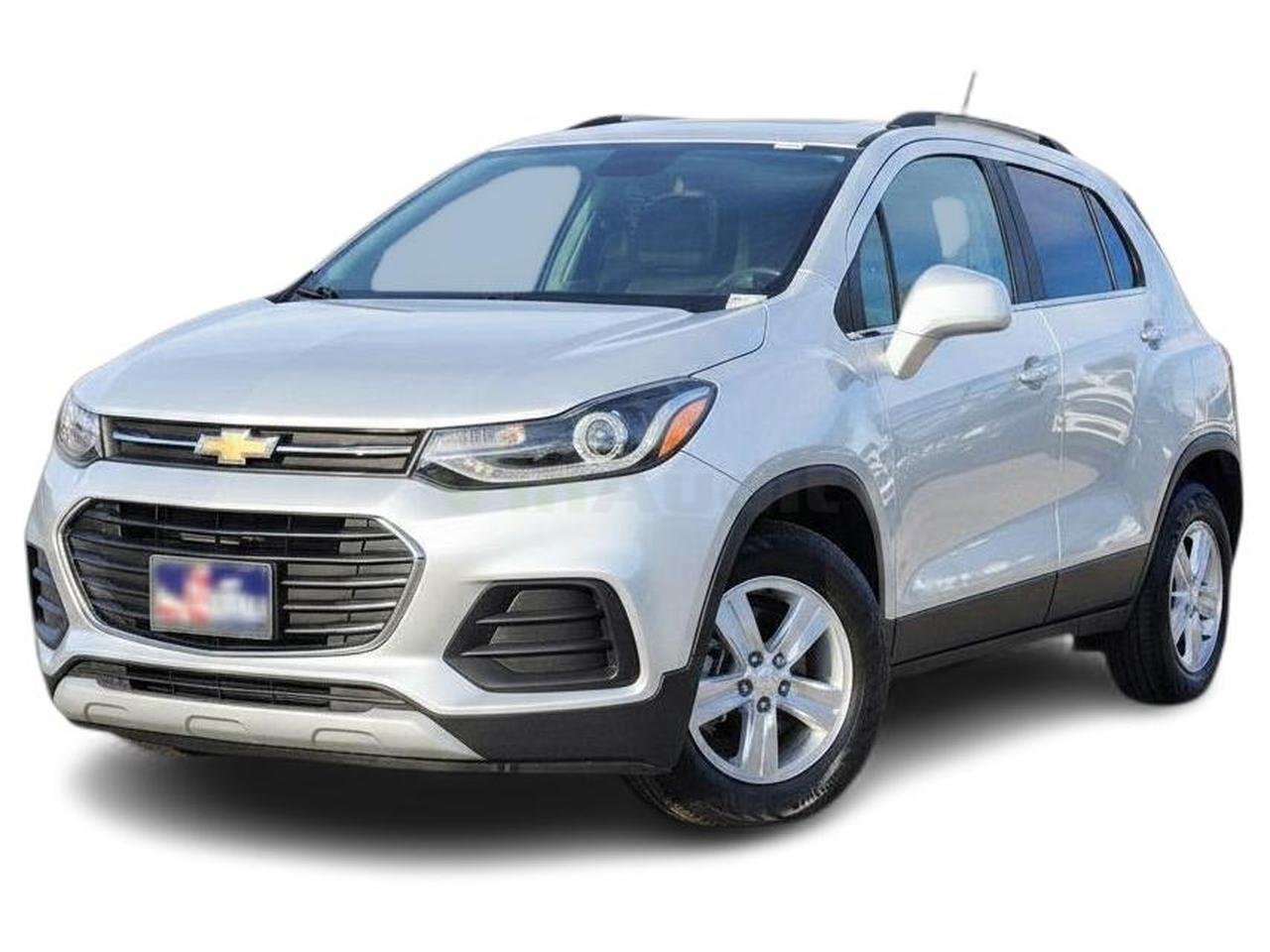The Good
The 2019 Trax offers excellent maneuverability and parking ease for city driving, appealing to practical buyers. Its respectable fuel efficiency and competitive initial value enhance its practicality. Emotionally, the elevated driving position, standard infotainment with Apple CarPlay/Android Auto, and available all-wheel drive provide a sense of security and modern connectivity, while its compact design proves surprisingly comfortable and versatile for urban adventurers.
The Bad
Known weaknesses for the 2019 Chevrolet Trax include an underpowered 1.4L turbocharged engine that can feel sluggish, especially on highways, and a somewhat firm ride quality. The interior, while functional, uses a lot of hard plastics and can feel less refined than some rivals. Cargo space, while adequate for its class, might be tight for some needs.
2019 Chevrolet Trax: Quick Overview
- Engine: All 2019 Chevrolet Trax models are equipped with a single engine option: a 1.4-liter ECOTEC turbocharged 4-cylinder engine.
- Horsepower: This engine produces 138 horsepower at 4,900 rpm and 148 lb-ft of torque at 1,850 rpm. It is paired with a 6-speed automatic transmission.
- Fuel Economy (EPA Estimated):
- Front-Wheel Drive (FWD): 25 MPG city / 31 MPG highway / 28 MPG combined
- All-Wheel Drive (AWD): 24 MPG city / 29 MPG highway / 26 MPG combined
- 0-60 MPH Acceleration: The 2019 Trax is not known for quick acceleration, with 0-60 mph times typically ranging from 9.3 to 9.8 seconds, depending on drive type and conditions.
- Towing Capacity: The 2019 Chevrolet Trax is not officially rated for towing by the manufacturer and is generally not recommended for towing. Some aftermarket sources suggest a minimal capacity of around 1,000 lbs for light loads, but it's best to avoid towing with this vehicle.
- Trim-Level Features:
- LS: The base model includes a 7-inch touchscreen infotainment system with Apple CarPlay and Android Auto, a rearview camera, Wi-Fi hotspot capability (subscription required), 16-inch steel wheels, power windows and locks, and 10 airbags.
- LT: Builds on the LS with features like roof rails, remote vehicle start, cruise control, tinted windows, LED daytime running lamps, 16-inch aluminum wheels, and available options such as a sunroof, Bose premium audio, and rear park assist.
- Premier: The top-tier trim adds 18-inch aluminum wheels, simulated leather upholstery, heated front seats, fog lamps, a power-adjustable driver's seat, and standard safety features like blind-spot monitoring with rear cross-traffic alert and rear park assist. It also offers an optional Bose audio system and an available integrated navigation system.
2019 Chevrolet Trax Specifications
Vehicle Information
| Year | 2019 |
| Make | Chevrolet |
| Model | Trax |
| Trim | - |
| Style | - |
| Type | Wagon |
| Category | Minivan Medium Truck |
Manufacturing Details
| Made In | Korea |
| Manufacturing City | DONG YUE |
Dimensions
| Doors | 4-Door |
| Curb Weight | - |
| Gross Vehicle Weight Rating | - |
| Overall Height | - |
| Overall Length | - |
| Overall Width | - |
| Wheelbase Length | - |
| Standard Seating | 5 |
Engine & Performance
| Engine | LUV - MFI, Variable Valve Timing, E85 MAX, ALUM |
| Engine Size | 1.4L |
| Engine Cylinders | 4 |
| Transmission | 6-Speed Automatic |
| Transmission Type | Automatic |
| Transmission Speeds | 6-Speed |
| Drivetrain | All-Wheel Drive |
Additional Features
| Anti-Brake System | Standard |
| Steering Type | - |
Pricing
| Manufacturer Suggested Retail Price (MSRP) | - |
| Invoice Price | - |
| Delivery Charges | - |
Vehicle History Report
Specifications
History
Events
History Check
Check
Check
Check
Check
Listings
Recalls
Check
Analysis
What Problems Does the 2019 Chevrolet Trax Have?
Transmission issues, such as hesitation during acceleration or rough shifts, have been less common but still reported for the 6-speed automatic transmission. Electrical glitches, particularly with the infotainment system or sensors, are also occasionally mentioned. Suspension components can sometimes develop noises, like clunks or squeaks, relatively early in the vehicle's life, possibly due to worn bushings or strut mounts.
As for recalls specific to the 2019 model year, there haven't been widespread, major safety recalls that dominate the vehicle's history. However, it's always crucial for potential buyers to check the NHTSA website for any specific VIN-related recalls, as minor campaigns can occur. For instance, some Trax models from this era, including the 2019, have had smaller recalls for issues like seat belt retractors or steering column components, though these are not as frequent or severe as engine-related concerns. Long-term reliability is largely dependent on meticulous maintenance, especially for the turbocharged engine. Neglecting oil changes or ignoring early signs of PCV or turbocharger issues can significantly impact the vehicle's lifespan and lead to costly repairs down the line.
How long will the 2019 Chevrolet Trax last?
What Technology & Safety Features are Included?
In terms of driver-assistance features, the 2019 Trax is less comprehensive than some newer rivals but offers crucial aids. A standard rearview camera provides essential assistance for parking and backing up. On the Premier trim, and optional on the LT, available driver-assistance features include Rear Park Assist, Side Blind Zone Alert, and Rear Cross Traffic Alert. These systems utilize sensors to help drivers detect obstacles and vehicles in typically unseen areas, enhancing safety and reducing stress in busy environments. Forward collision warning and automatic emergency braking are notably absent from the Trax's offerings for this model year.
Safety is a strong suit for the Trax, which comes standard with an impressive 10 airbags, including frontal, knee, side-impact, and head curtain airbags for both front and rear outboard passengers. It also includes StabiliTrak electronic stability control with traction control, ensuring stable handling. In crash tests, the 2019 Chevrolet Trax earned a 5-star overall safety rating from the National Highway Traffic Safety Administration (NHTSA), with 5 stars for frontal and side crash tests, and 4 stars for rollover. The Insurance Institute for Highway Safety (IIHS) gave the Trax "Good" ratings in most crashworthiness categories, including moderate overlap front, side, roof strength, and head restraints and seats. Its small overlap front (driver-side) rating was "Acceptable."
What Colors Options are Available?
2019 Chevrolet Trax Prices and Market Value
The Trax generally experiences moderate depreciation, losing a significant portion of its value in the first three years, as is typical for most vehicles. Factors affecting its resale value include its compact SUV appeal, standard tech features like Apple CarPlay/Android Auto (which help it stay relevant), and decent fuel economy. Conversely, its somewhat underpowered engine and basic interior materials can slightly diminish its long-term appeal compared to more refined rivals, impacting its depreciation curve slightly. High mileage and poor maintenance records will significantly reduce its resale value.
2019 Chevrolet Trax Cost of Ownership
2019 Chevrolet Trax Fuel Efficiency
2019 Chevrolet Trax Safety Rating
NHTSA
2019 Chevrolet Trax Insurance
reasonable repair costs.
How Does the 2019 Chevrolet Trax Compare to Other Wagon?
Performance: The Trax's 138-hp 1.4L turbocharged engine is often cited as its biggest drawback. It feels underpowered compared to the Honda HR-V (141 hp, but smoother CVT), the more sprightly Mazda CX-3 (148 hp, more engaging dynamics), and especially the Hyundai Kona (base 147 hp, optional 175 hp turbo, sportier driving). The Nissan Kicks (122 hp) is slower, but offers better fuel economy. For performance and driving enjoyment, the Kona and CX-3 are superior. The Trax's ride can also be firmer than some rivals.
Features: The Trax stands out with its standard 7-inch touchscreen, Apple CarPlay, and Android Auto across all trims, which was not universal among competitors in 2019. This gives it a significant edge in basic tech connectivity over the HR-V's less intuitive system or the CX-3's rotary-controller-based interface. However, the Trax lacks advanced driver-assistance features like automatic emergency braking, which were available on some rivals (e.g., Kona, CX-3) as optional or standard on higher trims. Interior quality also generally lags behind the CX-3 and HR-V.
Reliability: Reliability for the Trax is generally considered average. The 1.4L turbo engine has known issues (PCV valve, turbocharger) that can be costly. Rivals like the Honda HR-V and Toyota C-HR often hold a reputation for higher long-term reliability. The Hyundai Kona and Mazda CX-3 also generally fare well, though the Kona's turbo engine has had some isolated reports. Maintenance is key for the Trax.
Price: The Trax was competitively priced when new, and its used market value tends to be attractive, often making it more affordable than a comparable HR-V or CX-3. The Nissan Kicks often competes closely on price, while the Kona can be slightly more expensive, especially with the turbo engine.
Alternatives:
- For better driving dynamics and more power: Hyundai Kona (especially 1.6T) or Mazda CX-3.
- For superior practicality, cargo space, and fuel economy: Honda HR-V (though its infotainment is weaker).
- For similar value and even better fuel economy: Nissan Kicks (FWD only, less power).
The Trax remains a decent option for budget-conscious buyers prioritizing standard tech and city maneuverability, but it's overshadowed in performance and refinement by several competitors.

